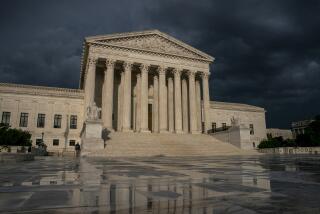Readers React: Originalists are just as wrong about the Constitution as fundamentalists are about the Bible

- Share via
To the editor: As I read Michael Long’s piece on the late Supreme Court Justice Thurgood Marshall’s unflattering view of the framers of our Constitution, vis-a-vis today’s debate on “originalism,” it occurred to me that an originalist is akin to a fundamentalist Christian who believes in the literal interpretation of the Bible.
Scholars have long taught that the Bible was never meant to be read literally, and yet many Christians today insist on doing just that. Originalists are making similar errors.
The Constitution needs to be a living document free to be responsive to the demands of an ever-changing nation, lest we remain mired in the past. Rigidity does not allow for the creativity needed to serve the diverse citizenry that makes up our country today.
John Beckman, Chino Hills
..
To the editor: If Marshall were one of our framers, we never would have had a Constitution.
Of course the Constitution was “defective from the start” — what document isn’t? However, better to have a defective Constitution than no Constitution at all.
One brilliance of our Constitution is that it allows for change — not by a couple of activist judges, but by amendment. Thus, the 13th Amendment removed the defect of slavery that Marshall used to denigrate the Constitution.
Finally, Marshall did not seem to understand the nature of our rights. The Constitution enumerates most of our rights; it doesn’t grant them. Rights are natural and thus not dependent on the actions of others. My right to free speech does not depend on others doing anything. However, a “right” to healthcare implies I should have the power to force someone to give it to me.
One may think it is a great idea to have universal healthcare, but that does not make it a right.
P.J. Gendell, Beverly Hills
..
To the editor: “Originalist” is a misnomer because no sane person would say that things are to be the same today as they were in the late 1700s. Rather, the thinking that created the Constitution was based on pragmatism.
Women’s rights did not exist then, and slavery did — a stroke of the pen could not change those facts of life. Trying to upend longstanding norms in the late 18th century would have resulted in such tumult that the very purpose of enacting a Constitution would have been undermined.
So, the only way to get a Constitution ratified by the states was to accept largely what was already in place while also providing for an amendment process that could add to or change the original document.
Larry Kirschenbaum, Newport Beach
..
To the editor: In Long’s telling, Marshall was indeed a respecter of the Constitution. Interpreting it as meaning just what the framers intended, he judged it to be badly in need of a corrective, the 14th Amendment.
This is a far cry from the postmodern approach, in which an ameboid document changes shape with the times. Presto chango, jurists can pull rights and authorizations out of a hat, no amendment necessary.
I would say this wasn’t what Marshall had in mind.
William D. Eisenhower, Beaumont
Follow the Opinion section on Twitter @latimesopinion and Facebook
More to Read
A cure for the common opinion
Get thought-provoking perspectives with our weekly newsletter.
You may occasionally receive promotional content from the Los Angeles Times.









